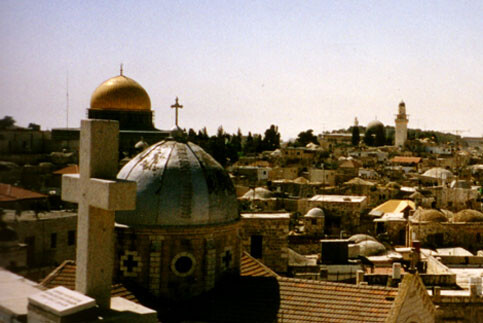
My cell phone is racist. I arrived in Tel Aviv thinking that I’d covered all bases, including the 19-year-old Shin Bet officer who pulled me aside when I got off the plane (My purpose is tourism… I’m staying with my girlfriend in Jerusalem… Her name is Phoebe Baron*… Yes, I’m a tourist… Jerusalem… That’s P-H-O-E-B-E B-A-R-O-N… She interns for the Minister of the Defense**… Well, thank you.). But as I forked over 600 shekles at the Pelephone desk at Ben Gurion International, I didn’t know that the damn thing would refuse to dial Palestinian area codes. But I wouldn’t realize this until I moved into my apartment in the West Bank.
Since this was my first trip to the “holy land,” I made a conscious effort to cast aside my anti-segregation biases, particularly those most essential to my tribe - conceived in Mississippi by a conflicted liberal Baptist and a radical civil rights carpet-bagging law professor from New York. Then there were my tainted professional years as a reporter in South Africa, where I was brainwashed mostly by black, unemployed Soweto residents who were openly racist against pro-Apartheid whites. It was high time to grow up and take a balanced view. Besides, I was meeting Phoebe for dinner in Jerusalem, and she had no idea that she was my girlfriend.
I figured the most effective way to achieve balance was to shake the bothersome “Israel = Apartheid” analogy, which was recently debunked by Manchester Metropolitan University’s Dr. Susie Jacobs (but only if you ignore the response by Greg Dropkin). With this new lens, I boarded a bus for Jerusalem, which was almost entirely populated by teenage boys and girls with M4 carbine assault rifles, some mounted with sniper scopes, others with grenade launchers. They were a well-groomed, attractive lot, with cool iPods. But like a militarized season of Beverley Hills 90210, there was the one troubled youth doomed to a single episode appearance. He was gaunt, somewhat anemic with a patchy beard and frowsy hair - the type you might find on the L train to Brooklyn at 4:00AM. If his superiors had the poor sense to issue him a gun, then he must have left it at a coffee shop in Tel Aviv. My heart went out to him. He was the modern day version of my 47-year-old South African friend Pierre, who used to sneak away from boot camp to play with his nieces and eat cake, I mean, no he wasn’t.
I arrived in West Jerusalem with an hour to spare before Phoebe left work, so I looked for an Internet cafe where I could answer a bunch of annoying emails about being “blown up by terrorists” on the aforementioned bus. Although West Jerusalem is mostly Jewish (there are 1.3 million Palestinians with Israeli “citizenship,” not to be confused with the 5.2 million Israeli Jews, nor the 5.3 million stateless Palestinians in the occupied territories), the fruits of Israel’s democracy were readily visible in this cafe, where one in 20 persons was Palestinian (i.e. the cafe had 21 workstations).
I was in the middle of writing that, indeed, there were potentially terrorizing snipers on the bus, and that, no, we didn’t hit a pothole that set off their grenades, when a commotion erupted from another part of the room. It was the Palestinian. Apparently, he had been anti-Semitic enough to sit at the workstation that another teenage soldier, who had just arrived, really liked. The soldier shouted something in Hebrew, which must have meant, “Excuse me sir, would you kindly mind allowing me to use this computer?” then methodically lifted the Palestinian by the back of his shirt and shoved him from the chair. Here again, I was forced to suppress my apartheid prejudice, especially since everyone else in the cafe took little notice of what had happened. And maybe I was being insensitive. Not that I would have thrown a fellow human from his chair, but perhaps the soldier, like me, had to write an urgent email. Within minutes, however, he was ensconced in a game of Grand Theft Auto - email would have to wait. Of course, one cannot make the wholesale claim that an incident like this would have transpired during Apartheid South Africa or Jim Crowe Mississippi. People didn’t even know what the Internet was back then.
My last contact with Phoebe was in New York City last May, when we met for drinks in Morningside Heights. She is by birth an Israeli citizen, and despite our political differences, we’ve maintained a warm friendship, with the exception of a week-long, I’m-mad-at-you silence here or there. More inevitable is the extent to which our paths cross at graduate school, and now the Middle East. At first I thought about asking her to meet me in predominantly-Arab East Jerusalem, because that would annoy her to no end. But I had turned over a new leaf. Dinner was on her turf.
We met on Ben Yehuda Street, and found a cute sidewalk cafe that served “Israeli Italian” cuisine. Ok. I had already gotten used to the children with machine guns, even the ones who weren’t in uniform - whatever they were - but to this day, I cannot grasp the Israeli proclivity to call everything “Israeli.” Nevertheless, I fell in line, and asked the waitress if she could bring me “some Israeli tap water in an Israeli glass and another Israeli napkin.” This irritated Phoebe. So I asked her if after dinner she would walk me to my hostel near the Damascus Gate in East Jerusalem (Israeli taxis won’t even go there), just to remind her that I was trying to irritate her.
Our conversation rebounded on the subject of the Gaza disengagement, in which, if you don’t already know, Israel plans to remove 8,000 illegal settlers from their pristine, stolen beach property, so that Gaza’s Palestinian population (about 1.5 million) can go on living a peaceful life without any control over their airspace, borders or coastline, and with frequent Israeli air strikes. For some reason, a lot of Israelis are really pissed off about this, and wear “revolutionary orange” bracelets and T-shirts to show their outrage. This totally annoyed Phoebe, not only because it was twisted logic, but she had recently visited relatives on a kibbutz who were wearing orange like crazy. I agreed with Phoebe, which was unusual. In fact, as our dinner wore on, I found myself agreeing with almost everything she said. “And you should see the way this government works. It’s a joke!” she said, and lit into the administration for its nepotistic practices, followed by a discussion on what little regard the government has, at all levels, for Palestinian lives.
When she was done, I asked, “Why do you still believe in all of this?”
Phoebe’s answer was similar to the countless times I’ve asked her to explain why Zionist socialism isn’t contradictory, she changed the subject. But this time it was different. “I think I could use a walk,” she said, “You know, I’ve never seen Damascus Gate at night.”
Zachary Wales is a journalist and masters student at Columbia University’s School of International and Public Affairs. He is also a co-founder of Labor for Palestine, and he currently takes summer courses at Birzeit University.
* Fictitious name used for confidentiality.
** Not actually that ministry, but close.




